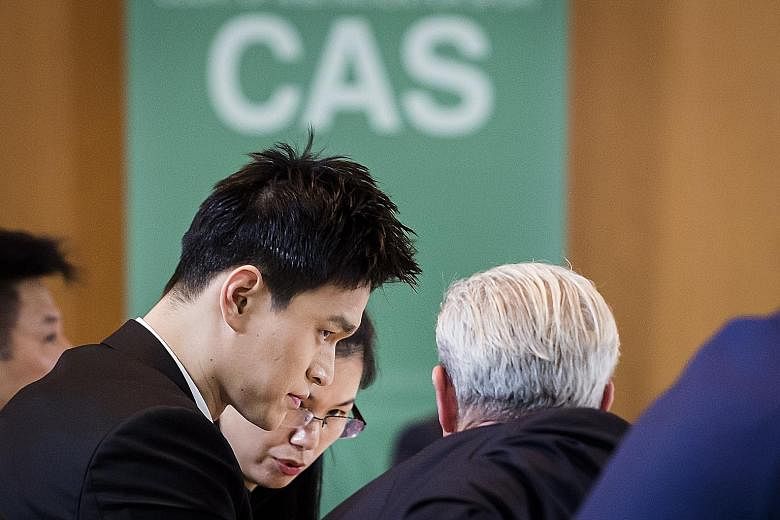MONTREUX (Switzerland) • Chinese swim star Sun Yang yesterday told the Court of Arbitration for Sport (CAS) that testers were at fault by failing to identify themselves correctly.
The three-time Olympic gold medallist, in a bid to clear his name following an accusation by the World Anti-Doping Agency (Wada) that he refused to give a blood sample voluntarily, attended a one-day public hearing that was marred by translation issues.
The case centres on an incident at his home in China last September, when a hammer was used to smash a vial containing his blood sample during an out-of-competition drug-testing session.
But Sun maintained his innocence and claimed the testers had ignored protocol by using invalid documents and illegally recording him.
Via court interpreters, he said: "If they had been professional and had shown their identification, we would not be here today. The officials were not even capable of proving their identity. How could I allow them to take my sample?
"If a policeman came to your house in the middle of the night and says, 'I'm a policeman, but I don't have any identification', how would you behave?
"I only saw Fina's authorisation letter. Although my English is not good enough for me to understand everything on the letter, I did not see my name on it.
"Neither did I see names of the three testing personnel on the letter. In my opinion, they should carry with them a clear document with their names on it in order to conduct a test on me."
Touching on the "ridiculous" behaviour of one of the doping control assistants, Sun added: "He took out his cellphone and started to film me. He said he was a fan of mine and liked me a lot. That's why I started to be suspicious."
Before the hearing, Sun also told Chinese news agency Xinhua that he wanted "the world to know what happened on the night of Sept 4, 2018", saying: "I want to call on international sports organisations in public to protect the basic rights of athletes."
At the hearing, representatives of IDTM, the Swedish firm that has carried out doping tests on behalf of Fina since the 1990s, said that the documentation supplied to Sun was standard and had been approved by swimming's world governing body. It added that last year, the same letter of authority had been used to collect 3,200 test samples without complaint.
The appeal was marred by translation issues, with Sun's lawyer, Ian Meakin, complaining that his client initially could not understand the court's interpreter.
"The translator has not translated," he said. "I'm sorry for leading but the translation was so bad."
Meakin also objected to an inquiry posed from Wada's counsel, saying it had been translated into Chinese as "200ml of blood" instead of "200 times" and called for a "correct translation if you want him to answer the question".
CAS general secretary Matthieu Reeb said that the interpreters were provided by the participants. But he admitted the problems made it more complex "because it slows down a little bit the procedure... and this is not a good point".
Wada took the case to the CAS after Sun was cleared of wrongdoing in January by Fina. The ruling will likely be made early next year.
Wada is pushing for a two-to eight-year ban, which would effectively end the 27-year-old's career.
Yesterday's court proceedings had been moved from the CAS headquarters in Lausanne to Montreux to cope with the "massive interest", with president John Coates quoted as saying "it was a pity we can't sell tickets" to the hearing.
This was only the second time in 35 years that a CAS hearing had been made public. In 1999, Irish triple Olympic swimming champion Michelle Smith de Bruin was banned four years for tampering with her urine sample.

